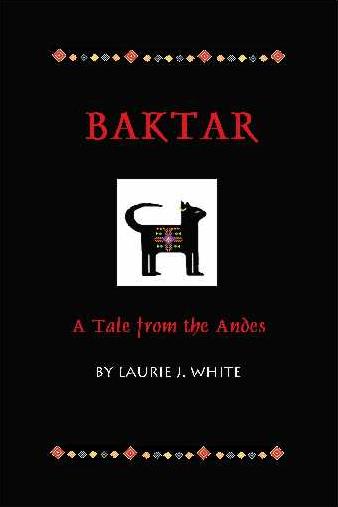 Baktar, A Tale From the Andes
Baktar, A Tale From the Andes
Historical fiction by Laurie J. White
List price: $10.95
98 pages softcover, historical fiction
For ages 8 and above
Baktar is not a common cat, even though he looks like one. He is a Royal Black Tarquoia, a mythical species, who lived among the ancient Inca of Peru high in the Andes Mountains. Baktar watches over his mistress Amasuwa, an Inca princess who is struggling with her fears concerning her upcoming marriage. Her grandfather Pachacuti, ninth king of the Inca realm, has his own concerns as he ponders the question of which god really is God and might there be just one? Baktar, meanwhile, is busy with his own escapades, but he is beginning to sense a lurking evil from which he must guard Pachacuti, if necessary, with his life. The scene is the beautiful and mysterious Machu Picchu, summer resort for the royal family. Young readers will enjoy this tale packed with fascinating details about the ancient Inca and wrapped in myth, intrigue and heroism.
Review: The Old Schoolhouse Magazine
For more reviews or to look inside the book
Available now on Kindle for just $1.45
Pachacuti’s religious quest is based on recent historical evidence (within the last 70 years) that King Pachacuti underwent a significant religious conversion during his reign. He turned from worshipping Inti the sun god, who was held by the Incas as the chief among many gods, to worshipping only one god, the invisible creator-god, Viracocha. There are extant hymns that were supposedly composed by Pachacuti to this creator-god and in which he gives his reasons for believing. These hymns ring with beautiful harmony to the scriptural proposition that there is a natural revelation of God which exists in His handiworks.
I first read about this evidence in Eternity In Their Hearts, a book by Don Richardson, missionary for Wycliffe and author of several books, including the well-known Peace Child.
Some of the topics incorporated into Baktar:
- The Inca religion
- the uniqueness of the Inca quipu and how it substituted for a written language enabling the Incas to have the most complex civilization ever to exist without a writing system
- Inca diet and their famous terraced gardens
- Inca roads which rivaled the roads of ancient Rome, as well as other engineering feats
- The Inca rapid message system that was unequaled by any other in the world at that time (meaning even Europe during the Renaissance era)
